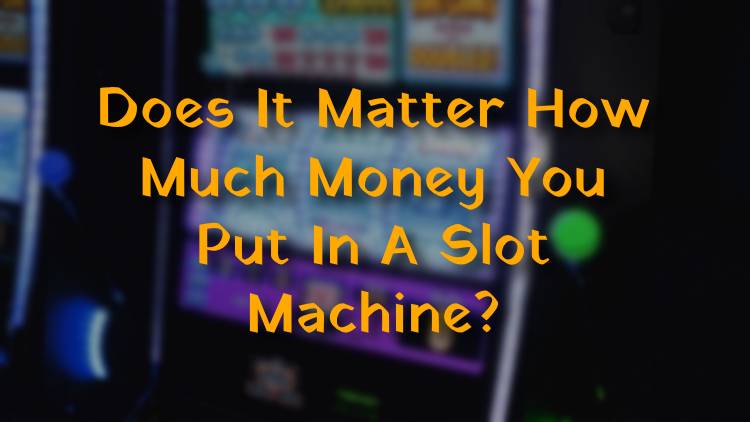
Slot machines are an undeniably popular casino game, primarily due to their simplicity and the entertainment they provide. However, there's often a recurring question among players - does the amount of money wagered on a slot machine affect the odds of winning? To clarify and debunk common misconceptions, we delve into this matter in-depth.
Does A Slot Machine Know How Much Money You've Put In?
To begin, we must answer the often-asked question – do slot machines track the amount of money you've inserted? The answer is yes. With advancements in technology, slot machines have to be able to monitor the money being put into them. This tracking is vital as it allows the machine to calculate accurate payout amounts should a player land a win.
However, it's pivotal to comprehend that this deposited money does not influence the results or potential payouts of the game. The machine uses this data solely to determine the winnings based on a player's stakes, thereby guaranteeing fair payouts for all players.
Does How Much Money You Put In A Slot Machine Matter?
A widespread fallacy among players is that increasing the money they wager on a slot machine boosts their winning chances. However, this belief is far from accurate. Slot machines operate on a system known as the Random Number Generator (RNG). This intricate mathematical system generates random number sequences, culminating in unpredictable outcomes for each spin.
The RNG is not swayed by the amount of money you input into the machine. Instead, its purpose is to ensure every spin is an independent event, each having the same odds of yielding a win as the preceding or following spin. These odds remain constant, regardless of the bet size.
In essence, this means that whether you place a £1 bet or a £10 bet, your odds of winning are identical. The game doesn't consider how much money has been input other than for the purpose of calculating payouts.
The only exception is in the case of some progressive jackpots. Some progressive jackpot systems require players to be playing at the maximum bet amount to even stand a chance of triggering it. However, this is not the case for all progressive jackpots, so please do your research beforehand.
How Do Slot Machines Determine Payout?
All slot machines have a Return To Player (RTP) rate, indicating the average amount of money a slot pays back as winnings from the total it takes in. This average is derived from a large sample of spins over an extended period. Due to the random nature of slots, this value is merely theoretical. Players may win more or less than the stated RTP rate, or they may not win at all.
Here's an illustration: if a slot machine has an RTP percentage of 95%, it suggests that over time, the machine averages paying out £95 for every £100 wagered. This payout percentage is calculated by the slot machine manufacturer. However, it's essential to remember that this is an average derived from millions of spins. Individual gaming sessions may not necessarily reflect this average.
Although RTP is an indicator of the theoretical payout rate, slot machines employ the RNG to determine the outcomes of each spin. The RNG is constantly generating random number sequences, even when the machine is dormant. When a player initiates a spin, the RNG halts at a specific sequence, corresponding to the combination of symbols displayed on the screen.
So, ultimately, it is down to the RNG whether the slot pays out or not, as the slot only pays out on a winning spin, and the RNG determines the outcome.
How Much Money Should You Put In A Slot Machine?
Read The Rules
The amount of money you decide to wager on slots is subjective and largely depends on personal preference. Since your odds of winning are the same, irrespective of the bet size, the decision rests on your preference and budget.
As mentioned earlier, some slot machines feature progressive jackpots, which may necessitate placing the maximum bet amount to stand a chance of triggering the jackpot. However, this requirement can vary between progressive jackpots, so ensure to read through the game's rules and terms and conditions before betting.
Consider Minimum & Maximum Bets
It's essential to evaluate the betting range offered by the slot machine. This range will provide insight into the minimum and maximum amounts that players can wager on each spin.
Evaluate Your Goals
Remember, the primary objective of playing slot games should be for entertainment, not for making quick profits. Therefore, only bet money that you're comfortable losing. Although the bet amount doesn't influence the odds, it does affect how much you could potentially win. The payouts are proportionate to the bet amount.
Conclusion
In conclusion, the amount of money you bet on a slot machine does not sway your odds of winning. Slot games are random, and winning is never assured. Therefore, the most crucial factor is to set a budget and adhere to it. Always gamble responsibly.
